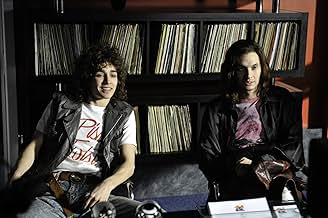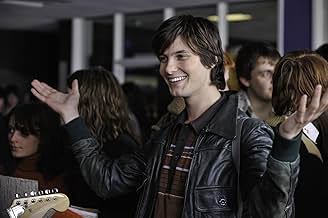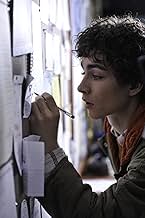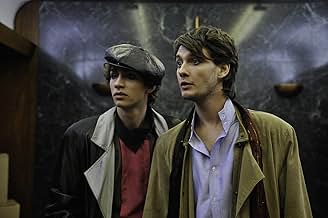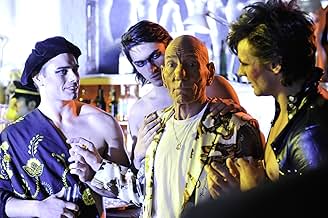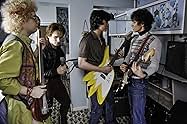CALIFICACIÓN DE IMDb
6.3/10
6.8 k
TU CALIFICACIÓN
Agrega una trama en tu idiomaTwo brothers attempt to become global rock stars but can only look on as old school friends U2 become the biggest band in the world.Two brothers attempt to become global rock stars but can only look on as old school friends U2 become the biggest band in the world.Two brothers attempt to become global rock stars but can only look on as old school friends U2 become the biggest band in the world.
- Dirección
- Guionistas
- Elenco
Seán Duggan
- Liam
- (as Sean Duggan)
Opiniones destacadas
To truly appreciate this film you'll either have to be 40 something plus or be heavily involved in your own peer group's music scene. The League of Gentleman have a failed musician character that they play for the pathos type of comedy. Here, a real 'failed' musician finds comedy in rewriting his own aborted attempt at snatching fame and fortune in the fickle music industry. It's a very affectionate account - skating gently over the less pleasant aspects of the industry. Robert Sheehan is a dream as Ivan - oooh yes you could really see him in the U2 line up - something brother Neil prevented from happening. I honestly was transported back to the 1980's and dodgy music venues and half baked bands performing as if their lives depended on it. Fabulous. Not everyone's cup of tea though. Pure nostalgia for me - but oh I do wish they'd managed to sneak in a bit more of actual U2 music.
I really enjoyed this movie. I have to admit, I initially had NO interest in the story, and only set out to see it to check out Ben Barnes' latest project. But within 10 minutes I forgot about watching "the lovely Mr. Barnes" (which he is not, in this movie) and was genuinely captivated by and became engaged in the story, the characters and the humor. I'd seen clips and responded with a yawn; thought the comedy portrayed in them was obvious and heavy-handed. But the trailer doesn't do it justice. The laughs were real and unexpected and the dialogue quick, natural and enjoyable. All of the supporting characters were excellent. Robert Sheehan, whom I'd never seen in anything prior, did a good job and Barnes disappears into and owns his character. All in all a fun watch, I'd recommend it.
I was pleasantly surprised by this movie! I had heard that this movie was weird and I had read about it that many was disappointed, but I don't understand it at all. I think it was a really good movie. Not even a minute I got bored and the story managed to keep me interested through the whole movie. In other reviews I have read that you have to be a bit older so that you have experienced the time when U2 was more popular than today but I don't agree at all. I'm fifteen and of course I know who U2 are but not in details. Maybe it's not the funniest comedy but it still laughed and it absolutely lives up to it's expectations in the comedy area and overall I really think this was a very good movie with good actors and I loved the music in it. If you are not sure either to watch this or not I absolutely recommend it, regardless of the age!
A few years ago there was an achingly trendy 'electro rock' band called Bono Must Die. It was sued out of existence by Bono himself who clearly didn't like the idea of young, hip people swinging their pants to tunes built on Bono-hatred. Now there's a new film out called Killing Bono, yet far from troubling the normally so sensitive singer, it has received his backing. It isn't hard to see why. It's like a creation myth for U2, depicting Bono as a long-suffering saint and his band as a punkish, rebel outfit rather than the Po-faced promoters of 'world music' they really were.
The film is based on rock critic Neil McCormick's book, I Was Bono's Doppelgänger. It tells the true-ish story of Dublin-born Neil and his brother Ivan trying to make it in pop and/or rock while continually being overshadowed by their former schoolfriends Paul Hewson and Dave Evans – otherwise known as Bono and The Edge, whose band The Hype later becomes U2 and conquers the world, while Neil and Ivan scrape by in a dingy flat in London where their numerous record company rejection letters are pinned to the wall in the shape of the word 'WANKERS'.
The trouble is that in turning U2 into the barometer by which he measures and gets miserable about his own rubbishness, McCormick's book and now celluloid life story make Bono a saintly, inscrutably good, otherworldly figure. Bono (Martin McCann) floats through the movie in a Christ-like fashion, always impeccably turned out, voice calm, never saying words like 'bollox' or 'shite' as his schoolmates and the McCormicks do. He does, however, eat chips at one point, which is a kind of shocking image.
It is entirely feasible, of course, that Bono really was like this: aloof, pure, pompous. That would not come as a surprise to anyone who has seen footage of Bono performing in the Eighties, with his big hair, high heels, and breathy, strangely American-accented mini-speeches about uprisings in Soweto (good) or uprisings in Northern Ireland (bad). Yet in investing Bono with an ethereal quality, in making him the yin to McCormick's yang, the movie comes across less like a rock biopic than as a conservative morality tale stuffed with righteous seers and wayward scallywags. Bono effectively saves the McCormick brothers, with a speech in the back of a limousine about brotherly love, in a not dissimilar fashion to the way Christ rescued James and John from a life of fishery.
The mythologising extends to the way U2's music is presented. They're depicted as the heirs to punk, bashing out Iggy Pop songs in a garage before going on to conquer and colonise a bland pop landscape with heartfelt music. In truth, far from being the punks of the Eighties, U2 were the equivalent of those Seventies Po-faced prog rock bands that punk eventually swept aside. U2's own comeuppance came towards the end of the Eighties when, after a decade of thrilling ageing rock critics and Americans but boring the rest of us rigid with their sweeping and serious guitar songs, they were elbowed aside by the rebirth of pop hedonism: rave, acid, baggy, whose adherents didn't go to gigs to learn about Nelson Mandela but to get smashed.
U2's out-of-touchness was brilliantly illustrated by their release in 1988 of the film and album Rattle and Hum, their most worthy dose of blackish, bluesy, Elvisy Americana to date, at a time when the kidz were knocking back Es and dancing like mental patients. 'Bombastic and misguided', said one critic of Rattle and Hum. 'Pretentious', said the rest. And of course U2 only made things worse when they tried to recover by releasing the electronic dance-inspired Achtung, Baby! in 1991. It was as if Jethro Tull had tried to play 'Pretty Vacant'. Just as the punks cheered upon hearing of the death of the fat, bloated Elvis in 1977, so some young 'electro rockers' today wish for the death of Bono.
It really is only a handful of serious rock critics who still treat U2 seriously, fantasising that they are 'real' where most others are fake. As a result, Killing Bono, the life and times of a rock critic in the making, ends up being deeply conservative. Part On The Buses, part Rattle and Hum, it combines slapstick humour with Bono sanctification to tell a pretty warped story about both U2 and the Eighties.
The film is based on rock critic Neil McCormick's book, I Was Bono's Doppelgänger. It tells the true-ish story of Dublin-born Neil and his brother Ivan trying to make it in pop and/or rock while continually being overshadowed by their former schoolfriends Paul Hewson and Dave Evans – otherwise known as Bono and The Edge, whose band The Hype later becomes U2 and conquers the world, while Neil and Ivan scrape by in a dingy flat in London where their numerous record company rejection letters are pinned to the wall in the shape of the word 'WANKERS'.
The trouble is that in turning U2 into the barometer by which he measures and gets miserable about his own rubbishness, McCormick's book and now celluloid life story make Bono a saintly, inscrutably good, otherworldly figure. Bono (Martin McCann) floats through the movie in a Christ-like fashion, always impeccably turned out, voice calm, never saying words like 'bollox' or 'shite' as his schoolmates and the McCormicks do. He does, however, eat chips at one point, which is a kind of shocking image.
It is entirely feasible, of course, that Bono really was like this: aloof, pure, pompous. That would not come as a surprise to anyone who has seen footage of Bono performing in the Eighties, with his big hair, high heels, and breathy, strangely American-accented mini-speeches about uprisings in Soweto (good) or uprisings in Northern Ireland (bad). Yet in investing Bono with an ethereal quality, in making him the yin to McCormick's yang, the movie comes across less like a rock biopic than as a conservative morality tale stuffed with righteous seers and wayward scallywags. Bono effectively saves the McCormick brothers, with a speech in the back of a limousine about brotherly love, in a not dissimilar fashion to the way Christ rescued James and John from a life of fishery.
The mythologising extends to the way U2's music is presented. They're depicted as the heirs to punk, bashing out Iggy Pop songs in a garage before going on to conquer and colonise a bland pop landscape with heartfelt music. In truth, far from being the punks of the Eighties, U2 were the equivalent of those Seventies Po-faced prog rock bands that punk eventually swept aside. U2's own comeuppance came towards the end of the Eighties when, after a decade of thrilling ageing rock critics and Americans but boring the rest of us rigid with their sweeping and serious guitar songs, they were elbowed aside by the rebirth of pop hedonism: rave, acid, baggy, whose adherents didn't go to gigs to learn about Nelson Mandela but to get smashed.
U2's out-of-touchness was brilliantly illustrated by their release in 1988 of the film and album Rattle and Hum, their most worthy dose of blackish, bluesy, Elvisy Americana to date, at a time when the kidz were knocking back Es and dancing like mental patients. 'Bombastic and misguided', said one critic of Rattle and Hum. 'Pretentious', said the rest. And of course U2 only made things worse when they tried to recover by releasing the electronic dance-inspired Achtung, Baby! in 1991. It was as if Jethro Tull had tried to play 'Pretty Vacant'. Just as the punks cheered upon hearing of the death of the fat, bloated Elvis in 1977, so some young 'electro rockers' today wish for the death of Bono.
It really is only a handful of serious rock critics who still treat U2 seriously, fantasising that they are 'real' where most others are fake. As a result, Killing Bono, the life and times of a rock critic in the making, ends up being deeply conservative. Part On The Buses, part Rattle and Hum, it combines slapstick humour with Bono sanctification to tell a pretty warped story about both U2 and the Eighties.
I think the story this movie tells actually had some legs on it. It was interesting, there was depth and insight in it, but the director chose exactly the wrong tone for telling it and the result is an addition to the list of failures associated with the central figure. The tone is a mediocre wanting-to-please-everyone Grange Hill TV vibe with none of the serious themes coming through well because everything is played for light, obvious, almost slapstick laughs; it's delivery so rooted in dated TV stylings that you wonder what the production team were thinking. Sure the story is from the 80's but cinema has grown leaps and bounds since then. Look to the documentary Anvil for how something like this could better be handled. Some of the cast were well chosen but their delivery was well off, in keeping with the bad choice of feel. I wish this film was better, and another production team may well milk it for the good it has in its story, if it gets another shot at its 15 mins of fame. On a side note original videos of the real band shook up show them to be something quite terrible, so that kind of ruins everything.
¿Sabías que…?
- TriviaThe real brothers Ivan and Neil McCormick made a cameo in this movie. They are the folks watching one of the first gigs in an empty bar.
- ErroresAt the bands first practice (in 1976) Ivan McCormick suggests playing a song by Dire Straits. Dire Straits recorded their first album in 1978, so none of them would have known any songs by Dire Straits, let alone have even heard of them.
- Citas
Ivan McCormick: You made the worst decision of my life!
- ConexionesFeatured in Ebert Presents: At the Movies: Episode #2.16 (2011)
Selecciones populares
Inicia sesión para calificar y agrega a la lista de videos para obtener recomendaciones personalizadas
- How long is Killing Bono?Con tecnología de Alexa
Detalles
- Fecha de lanzamiento
- Países de origen
- Sitio oficial
- Idioma
- También se conoce como
- Hạ Gục Bono
- Locaciones de filmación
- Productoras
- Ver más créditos de la compañía en IMDbPro
Taquilla
- Total a nivel mundial
- USD 717,798
- Tiempo de ejecución
- 1h 54min(114 min)
- Color
- Mezcla de sonido
- Relación de aspecto
- 2.35 : 1
Contribuir a esta página
Sugiere una edición o agrega el contenido que falta







